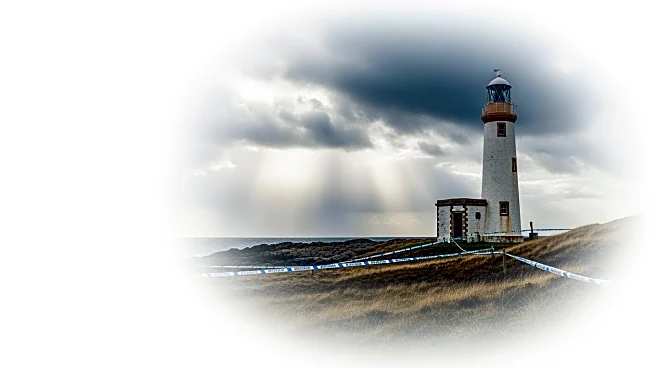What's Happening?
Graeme Macrae Burnet's novel 'Benbecula' is set in the mid-19th century on a small Scottish island, where residents live a subsistence lifestyle. The story is narrated by Malcolm MacPhee, who recounts
the brutal murders committed by his brother Angus, who killed their parents and aunt. The novel explores Malcolm's isolation and his struggle with the aftermath of the violence, as he lives alone in a deteriorating house, visited occasionally by a priest and a neighbor. The narrative builds tension around the events leading to the killings, despite the reader knowing the outcome from the start. Burnet uses historical documents to craft a story that delves into themes of consciousness and the human mind's integrity.
Why It's Important?
The novel 'Benbecula' offers a deep exploration of human psychology and the impact of isolation, which can resonate with readers interested in understanding the complexities of mental health and familial relationships. It highlights the challenges of living in remote areas and the psychological effects of violence and solitude. The book's publication by Biblioasis, an independent publisher, underscores the importance of diverse voices in literature, providing readers with unique perspectives on historical events and human experiences. This novel may appeal to those interested in historical fiction and psychological narratives.
What's Next?
Readers of 'Benbecula' may anticipate further works by Graeme Macrae Burnet that continue to explore historical narratives and psychological themes. The novel's reception could influence Burnet's future projects and encourage publishers to support similar works that delve into complex human emotions and historical settings. Additionally, discussions around the book may lead to broader conversations about mental health and the effects of isolation, potentially impacting public awareness and policy.
Beyond the Headlines
The novel's exploration of isolation and mental health raises ethical questions about the treatment and understanding of individuals in remote communities. It may prompt readers to consider the societal responsibilities towards those living in isolation and the importance of mental health support. The story's historical context also invites reflection on how past events shape contemporary views on violence and family dynamics.









